The King of Wakanda doesn’t necessarily seem like a superhero in need of restorative treatment. In the Marvel Universe, he’s the ruler of the most advanced nation on the Earth, along with being a multi-disciplinary genius. But, in the newest Black Panther comics, both T’Challa and the nation he reigns over have internal problems that they need to address.
It’s a weird thing when someone you’ve hung out with starts writing your favourite superhero character. I’ve known Ta-Nehisi Coates casually for the better part of a decade. Our contact over the years was mostly incidental, such as run-ins at book events or friends’ birthday parties here and there. But we’ve reconnected ever since he started writing the Black Panther for Marvel, chatting regularly about our favourite past and present runs and what he’s learning about the craft of comics-making from the inside. These conversations have made me recuse myself from writing anything evaluative about his work so far but we’ve been talking privately about what I enjoy about his Panther run.
However, Black Panther #6 is out today and it’s got a moment that I think deepens the aggregate personality of the title character, and warrants talking about publicly.
The issue, written by Coates with art by Chris Sprouse, Karl Story, Laura Martin and Joe Sabino, is the halfway point for the series’ first season and finds the internal philosophical turmoil over whether Wakanda should be steered by sovereignty or democracy exploding into open armed conflict. The series has had T’Challa working out his own sense of himself as he tries to rebuild a once-unconquered country, extrapolating on the vision of Wakanda advanced by Christopher Priest and Reginald Hudlin’s tenures on Black Panther.
In the conversation that follows, Ta-Nehisi and I talk about what drives his approach to T’Challa and Wakanda, how the spiritual journey that Shuri is on will change T’Challa’s sister and his thoughts on a certain stripe of negative fan response.
I want to go back and get a sense of is your feelings towards T’Challa before you started writing him. I know you’re a Spider-Man and X-Men fan. guy. When this guy showed up on a page of an Avengers story, what were your thoughts?
Ta-Nehisi Coates: I didn’t really have many. The period where I was most intensely reading is mid-to-late ’80s. T’Challa is not in Fantastic Four. He’s not in the Avengers. I had looked at back issues and realised that he had been in the Avengers. I thought that was cool. I was interested in things like who he was and what happened.
There is one issue of Fantastic Four I have and it was in that period where the Thing had kind of mutated where the Black Panther appears but I don’t even have strong memories of his appearance. Evan, you would know better than me, but my recollection was that he was not in Secret Wars, he’s not in the big events, he’s not in Under Siege, he’s not in Mutant Massacre. Is he around?
In terms of his publishing history, back then he would show up in team books as a guest star and that’s it. He wasn’t leading a title.
Coates: Yeah. I missed most of it. In my strong formative period, there was really not a T’Challa presence. I didn’t really have too many formed feelings. I had read some of Priest’s run by then. It was when I got the assignment. I had read Panther related titles… even with Priest’s run, I had come in at this awkward moment, which a lot of people don’t like. That was when the Panther had given up the title to my man. What’s his name?
Kasper.
Coates: Kasper. I came through Kasper.
You started reading Black Panther during that storyline? That’s crazy.
Coates: Yeah, the first Black Panther book I bought was with Kasper. It’s not T’Challa. I was really intrigued by that. I was like, “This is weird.” My tastes are kind of weird. One of the things I am facing now is that comic fans are essentially conservative — the most hardcore fans are artistic conservatives.
I have a part of me that’s like that, but in large respect, I kind of like being thrown out. I like when the rules are thrown out and sort of flipped. I guess part of that is because the moment I came to comic books and art, period. I always talk about when I started reading X-Men when Storm — whose defining feature is the ability to control the weather — has no powers. I picked up Black Panther at a point where there’s no T’Challa. I was smart enough to know that there should have been a T’Challa.
The action wasn’t even in Wakanda, either.
Coates: No, not at all.
The reason I was asking about your prehistory with the characters, I feel like it really informs what you’re doing in the book now. You don’t have a nostalgic, fannish attachment to T’Challa from the ’70s or ’80s or even the ’90s incarnations. And you’re subverting a lot of the stuff that reinvigorated him, which is an interesting place for you to be.
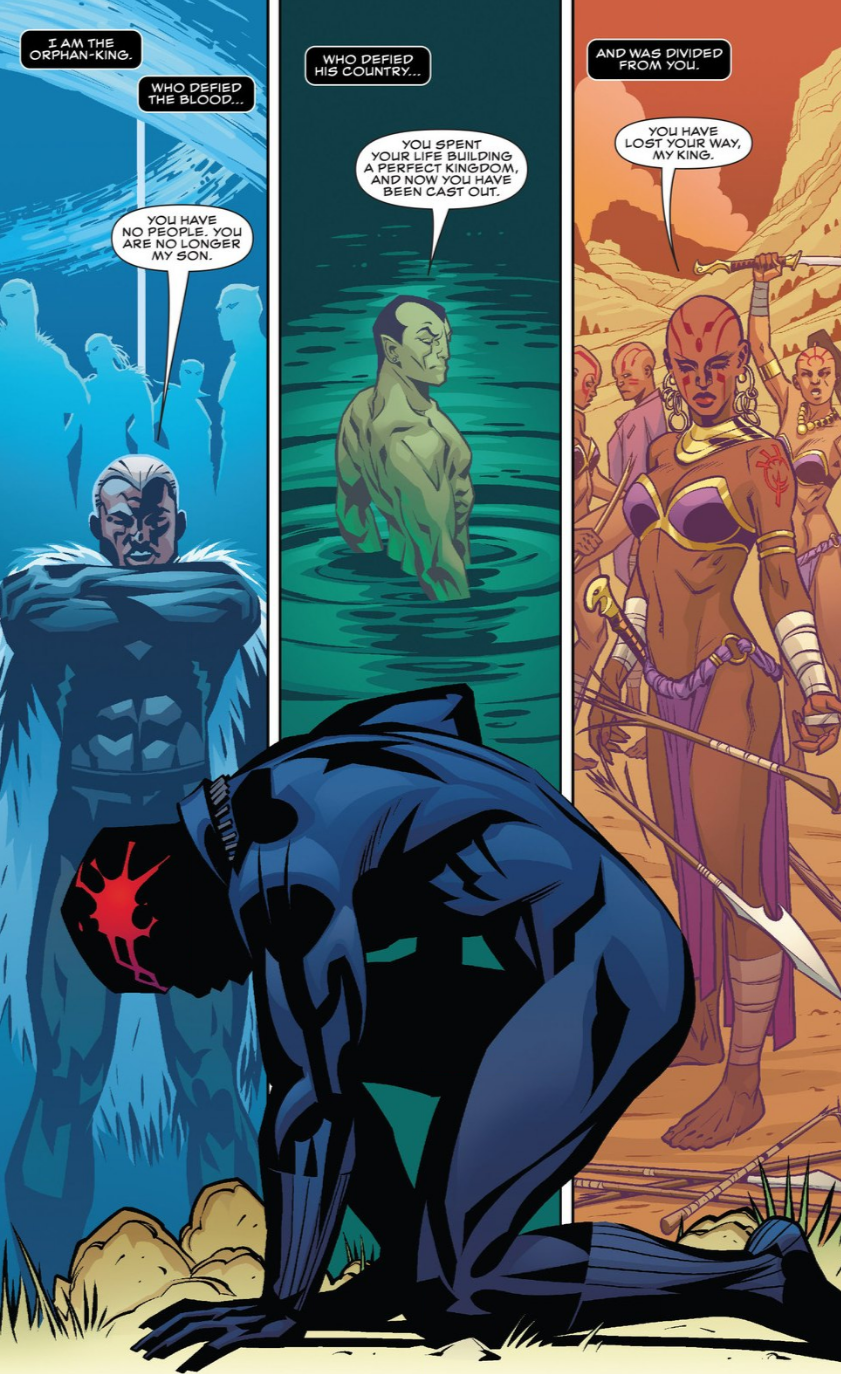
Coates: I hadn’t even considered that or thought about that. What’s interesting though I think it would have been a really big challenge if I had gotten a book like X-Men or Spider-Man because I think I would probably have had to lose some of that [fannishness].
That’s part of what you sign up for when you’re writing mainstream superhero comics. You’re forging the link and the chain. You can’t ignore there’s a link behind you and there’s going to be one in front of you. But the thematic underpinnings of your run are only possible because of what happened before.
Coates: It’s heavy on continuity but the vibe of it, the feel of the comic book, it’s not heavy on fandom. It doesn’t feel like this is being written necessarily by somebody who was a longtime fan of the character.
You’ve gotten a mixed response from longtime fans of the character. Some people assume that you’re kind of undermining this idea of T’Challa as a master strategist. Where you think that response comes from?
Coates: If we’re going to be straight and honest about it I think it comes from a couple of places. First of all I think there are very, very few African-American heroes, period. Certainly African heroes like T’Challa. That’s just definitely true. You’re not really going to see too many. I think in a lot of people’s minds T’Challa is a lot like Denzel [Washington].
He’s supposed to be smooth and effortlessly do x, y, and z. In addition to that, I think before my run, there were several things that happened at Marvel, like some bad things happened to Wakanda. First of all you’ve got Priest. Priest’s job is to get white folks to take T’Challa seriously. T’Challa ain’t no chump. He established that pretty well.
After that, Reggie comes in, he says, “Not only is T’Challa not a chump, but Wakanda ain’t to be fucked with, period.” Like ever. Don’t even think about it. We’ve been wrecking fools since time immemorial.
But between Hudlin and me, a lot of other things happened. I can’t answer for other writers … but other writers made decisions. Between doing Avengers vs. X-Men and Time Runs Out, there’s a lot of fucked-up shit that happens to Wakanda. Then I come in as a writer.
I understand the need, particularly among black fans, to see T’Challa be a certain type of way, even to see him restored to a certain place. This is like in my bones. I feel a deep responsibility to history. I can’t act like that stuff didn’t happen. I guess I could.
Let me rephrase tha:. I could. What I could have done was said, “OK, T’Challa used the Time Gem. He went back to x, y, and z.” This [kind of thing] is always open to interpretation to some extent. But for me, it couldn’t have been the Time Gem. Because if there was a Time Gem and he restored everything to perfection, why does the Squadron Supreme have to kill Namor, if the events leading up to Secret Wars actually happened?
If you read other books, if you’re paying attention to the Marvel Universe, it’s clear that this shit actually happened. OK, so that rules out the Time Gem. Maybe it’s a reality check. Maybe it was the Reality Gem. Maybe he changed as much as he could. He can’t take every little thing. But you can’t pretend it just didn’t happen because it’s clear that it did happen if you’re reading the other books.
I like how you’re taking this comic book shop argument approach to how you could have done some other shit. These are the kind of conversations I used to have.
Coates: But, Evan, you know what? The real deal here is I started writing the Black Panther before I got the last script for Secret Wars. That’s the actual real deal — “Oh fuck. I don’t know how Secret Wars is ending.”
I literally did not know. I knew before everybody else. I had to figure out what the world was and the idea that everything would be wiped back to the beginning? I don’t even know if that was what Jonathan was trying to do.
But the idea of completely wiping the world just didn’t seem like that was going to actually fit. It’s clear, again, if you read the other comic books that the other writers did the exact same thing. They tried pretty much to assume that the history was a fact and that it happened. The editors obviously made a decision to do that. So you’re faced with this character, man, where these fucked-up things did happen.
It’s funny, even if you were to use the kind of outs that you are talking about, like T’Challa, a man of his conscience, that would have eaten away at him. He’s like, “Oh yeah, I restored the Realm to what it’s supposed to be ideally but I had to use some fucked up shit to do that.” I think that would have eaten away at him too.
Coates: It just feels kind of cheap. I don’t know if this will make any sense, and I don’t know if comic book fans would think about it like this, but it does not feel artistically honest. My intuition [proceeded] from what actually happened. What that means is when you open your book, you don’t have Denzel, man. [Or rather] you got Denzel… what’s that movie where he’s a drunken pilot?
Flight.
Coates: Longtime fans of the character obviously got something out of seeing T’Challa a certain way, that we all need. [It’s what] white fans get out of seeing Captain America a certain way or seeing the Punisher a certain way.
They each represent certain ideals.
Coates: Yeah, yeah. Definitely. So you pick up the Black Panther and you’re not really getting that, so it’s like, “What the fuck man!” Where do I go to get my black — and I would add this because I think it’s very important — male machismo? Where do I go to get that feeling of power that I need to get reading Black Panther?
I think the first part is defensible. I think the less defensible element of it is that what I have come to really, really see is that a lot of times male comic book fans use comic books as a kind of male-bonding exercise. A kind of exercise in power, like power fantasy. I don’t think that’s particular to what folks want out of Black Panther, but I think that is something that happens in comic books.
In much the same way what people do with say football. Do you know what I mean? They are projecting things out into the character and they want certain things to be just so. I didn’t come to comic books in that way. I can only be who I am. In my formative period of reading, say X-Men, Spider-Man, these are not good times. The X-Men are divided. They’re everywhere. Everything is going wrong. Everybody is trying to kill them. That was the formative period to me.
This is horrible to say, [but] I can’t be responsible to the fans. I can’t write for them. The old fans from years ago are listening to this going, “What the fuck, man?” But I don’t think an artist can. I don’t think even I want to consume art where people are writing for me or to me. You have to write to the ages. I have to write in such a way that I think that five years from now somebody will pick this up and say, “Damn, that was incredible.”
That gives me a nice segue to start talking about the run, because part of the appeal of Wakanda and T’Challa both were you, as a reader, were getting perfection. You were getting a perfect country that’s never been conquered and a king that was arguably one of the best strategists on the planet, if not the multiverse.
Then your run begins with an open revolt in Wakanda. The country is more vulnerable in a way than it’s been in arguably centuries. I think it’s hard to read love for the character from that kind of a premise. But to me, the things that have happened in the comics have been really transformative for the character.
Coates: I would correct you: it’s hard to read veneration of the character from that perspective. I would distinguish love for the character and veneration for the character…
Fair. But you know at the end of the first issue we see his sister Shuri, dead or near dead and T’Challa can’t revive her. He can’t let go enough to let her make her journey. That was a first sign of letting me know that his head is not in the place where it has been.
Coates: Right. Again, picking the book up where it was, if you want be to writing human beings, I have to ask myself [to consider] “a human being is raised with an idea that their country is unconquerable.”
That has been proven to be untrue. In the process of that being proven to be untrue, the human being has lost his uncle, he’s lost two of his closest friends and colleagues, and he has abandoned his sister — not because he was a coward, but abandoned his sister because the world had to be saved. That meant leaving her to face Thanos, to face the worst possible people.
Here’s a guy whose father and ancestors turned on him. I’m writing human beings. I’m not writing robots. What does that do to you? Thanos decimates Wakanda. You know what I’m saying? I can’t come in and have T’Challa be like, “I’m still smacking fools.” That’s power fantasy. That’s not really real. Even as I say all this — so I don’t get caught up in this — I’ve got to acknowledge the fact that the book is selling really well. People who are buying the book must be feeling this too.
Having said that, we gotta be really clear, we are not addressing the majority of people. What we are addressing are people who love the character and who have loved the character for a long time. They’re important to the book. You want people who are part of carrying that legacy to be there but you don’t want make the mistake of thinking that’s the majority of the people who are reading the book.
The other thing that surprised me has been the Dora Milaje just being fed up and breaking away from the throne and no longer acknowledging the sovereignty of T’Challa. What inspired that?
Coates: It’s the same question I just asked you about T’Challa. Here’s an order that breaks from T’Challa. They actually break from him in previous events before I get there, right? They break the spears and symbolically disavow him. So the break actually happened before I was there. But some aspect of the fissure is already within the history once I get there.
Here you have an order that’s pledged itself to the king. They have given up whatever individual liberties you have in order to be part of it. They’re seeing that their king is treating with [Namor,] the guy who drowned God knows how many Wakandans. They’re seeing that their queen, as far as they know, has died trying to defend their country.
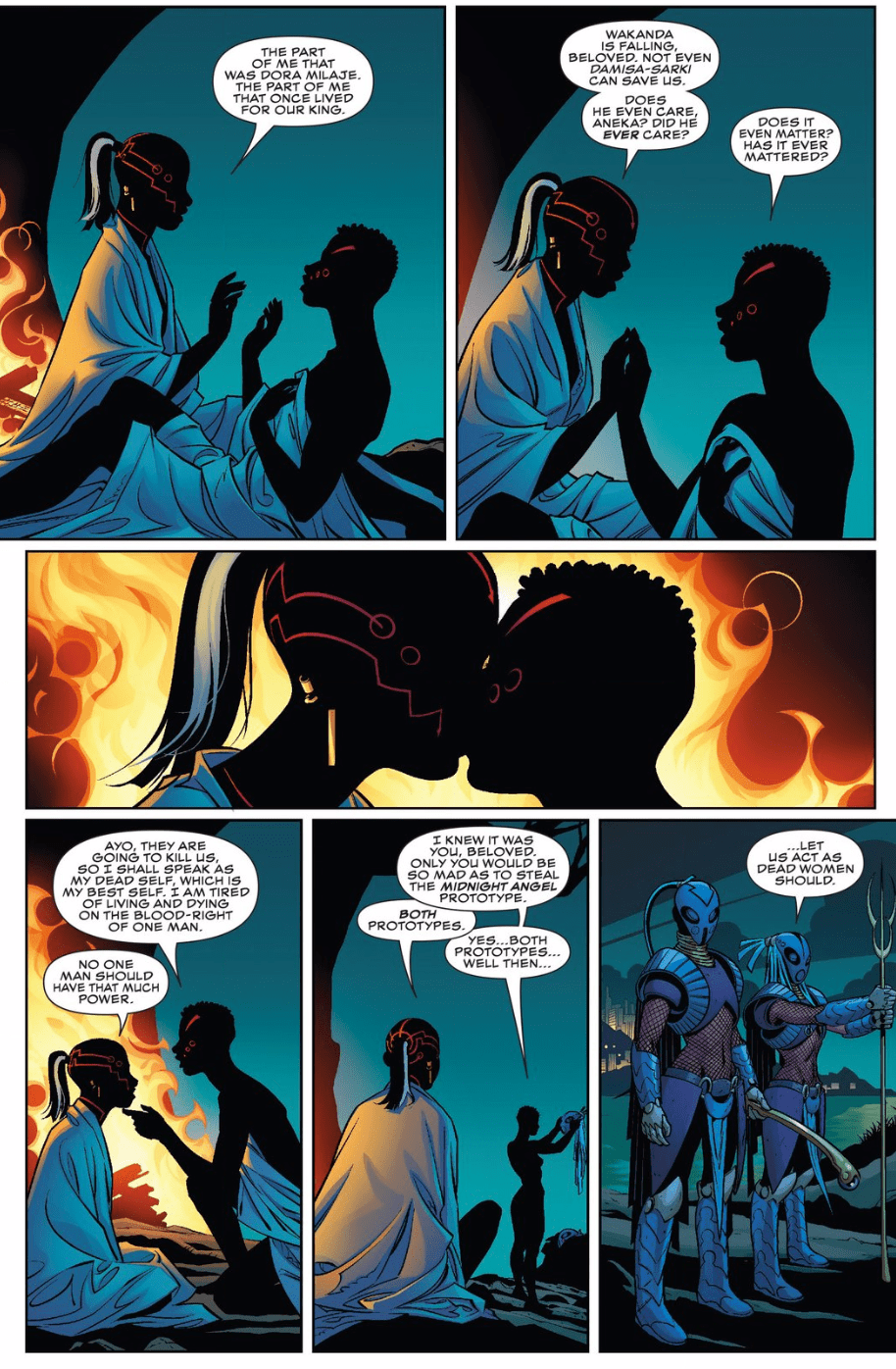
What is their relationship to Wakanda then? What’s their relationship to their king? How do they feel? I have to ask questions. I have to ask questions of human beings. What are their own private individual wants?
We talk about empowering women and sexism in comics. All it requires is you elevate characters as human beings. You don’t have to make them perfect. Ask human being questions of them.
Previously, they had mainly been arm candy for T’Challa — albeit arm candy that could kick arse. There was a certain shallow satisfaction to be had there.
Coates: People aren’t going to like this, but that’s what it was. They were accessories to T’Challa. I’m uncomfortable with that. I’m uncomfortable writing women… fuck it… I’m uncomfortable having any people who are just accessories to T’Challa, who are effectively extensions of his arsenal. I’m uncomfortable writing that.
I think the core of what we’re talking about has been the Priest execution on T’Challa, the fandom around that execution, and the idea that you’re executing, which is kind of in opposition to that. But if you read the Priest run, when T’Challa acts his most kingly, he’s also a major arsehole.
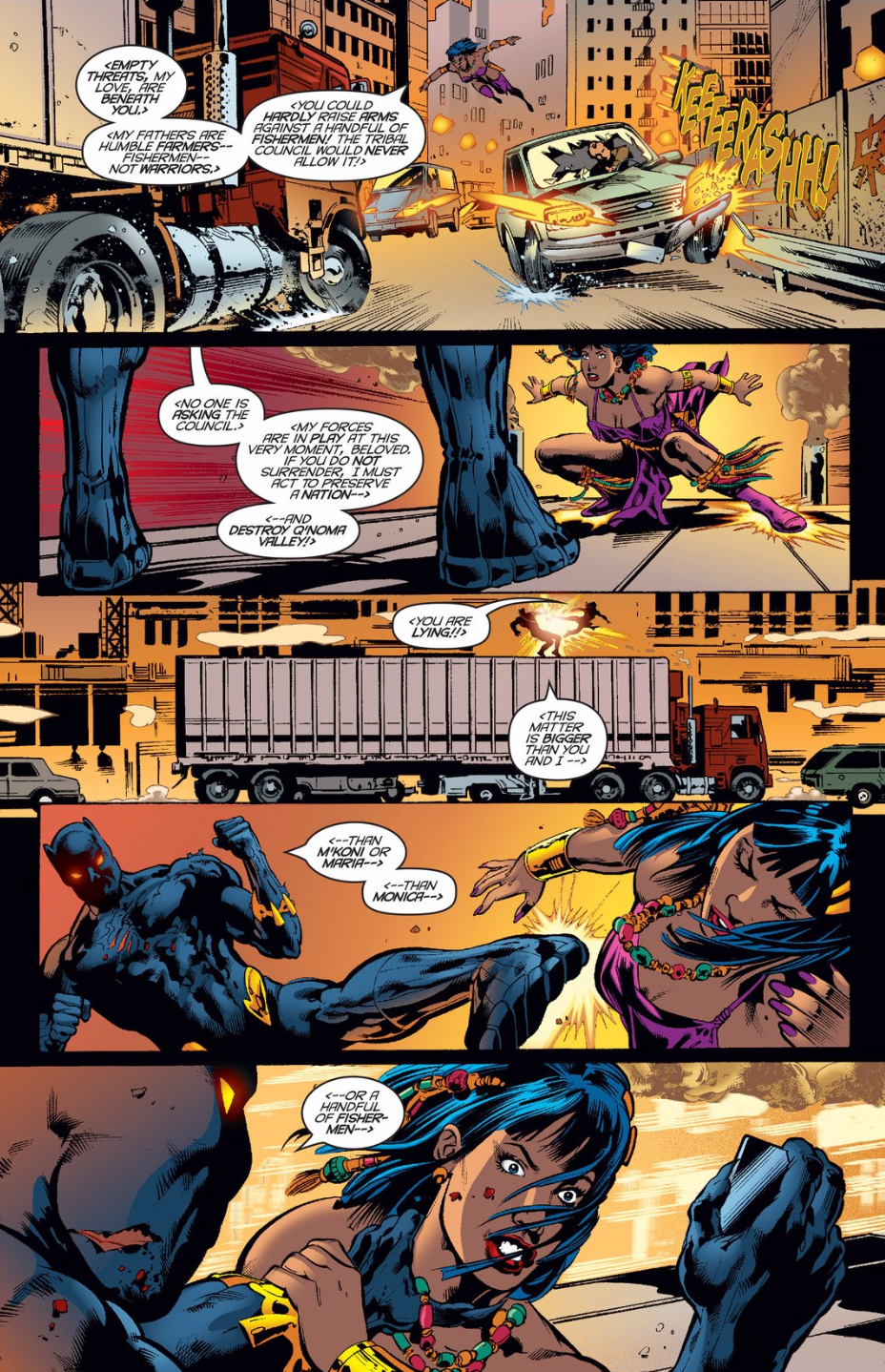
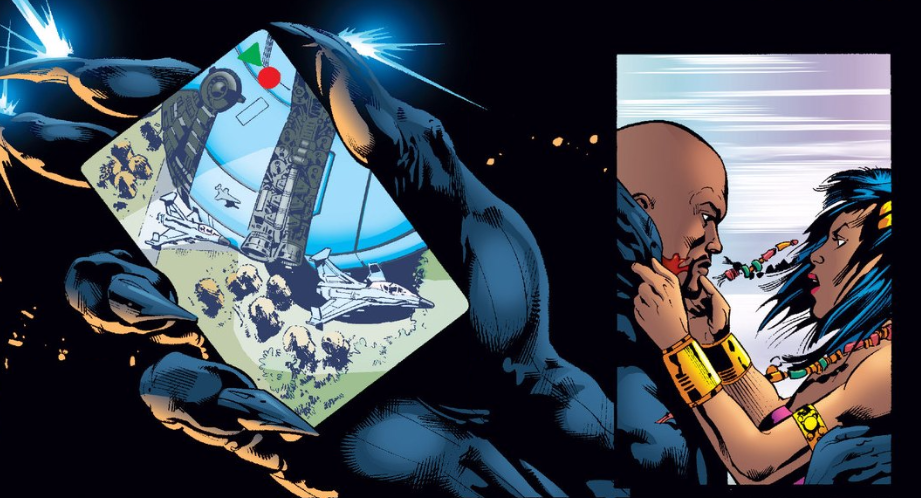
When he confronts Nakia after she leaves the Dora Milaje and becomes the villain Malice, he tells her he’s got warships all over the region where she’s from, and is going to blast it to bits. That’s not a superhero move.
Coates: No, it’s not. This is probably the big interpretive difference between the two of us — I could be wrong about this — if you read Priest’s book, T’Challa is a king who happens to be a superhero. Mine is probably a superhero who happens to be a king.
Interesting.
Coates: I probably went in the other direction.
I think if you look at the whole history of the character tonally and in terms of his characterization, the Priest run is an anomaly. It’s a good one. But if you look at the character historically before that, T’Challa is empathetic and compassionate. He’s a compassionate, emotionally-driven ruler who hears out his people.
Coates: Priest can better comment on this himself, but again, if you’re going to take the task of getting people to respect him as mighty and powerful, part of that having him act like an arsehole. That’s part of him as a ruler, right?
Yeah. What’s most interesting to me about issue #6 coming out is the page where you sort of do a reverse on the Avengers reveal from Priest’s run, where he tells the Avengers he only joined to spy on them.
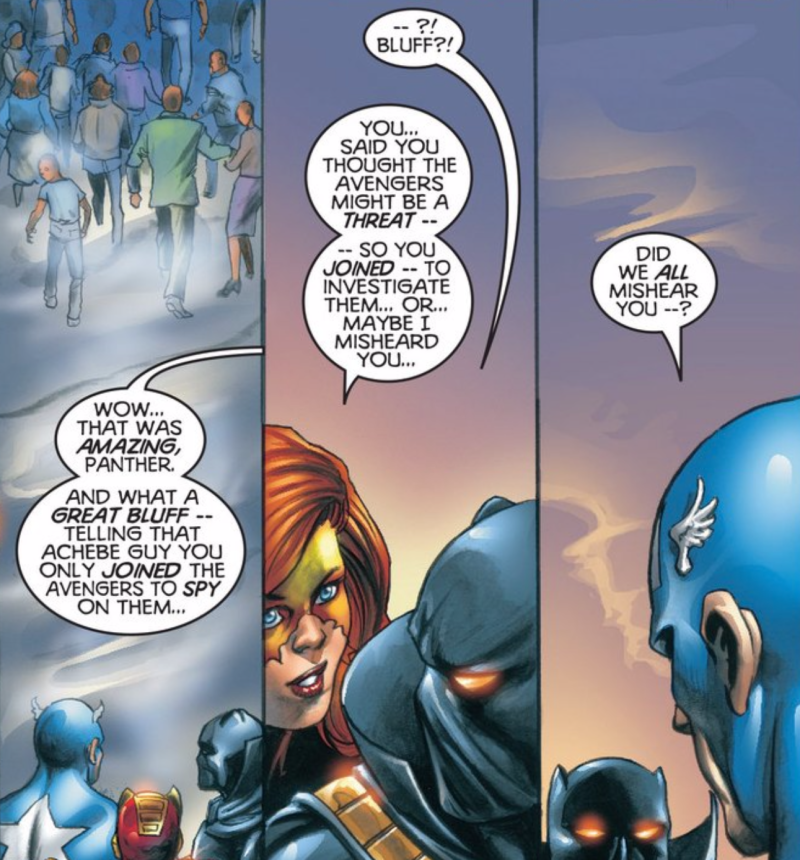
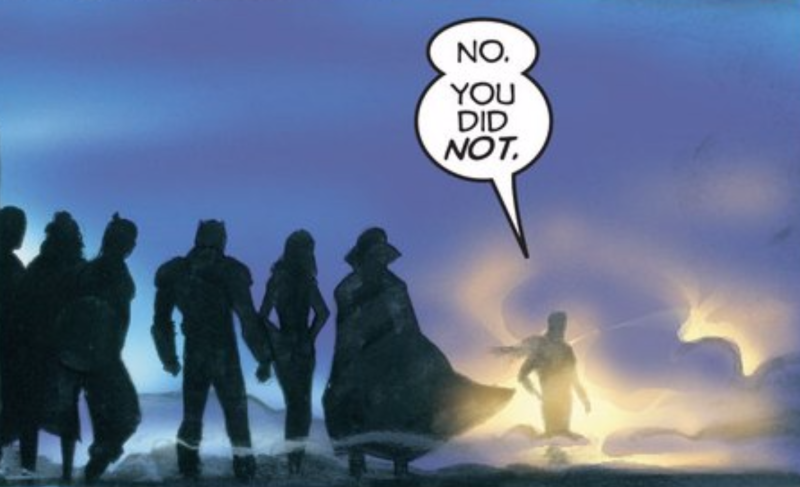
You put this revelation in an entirely different context.
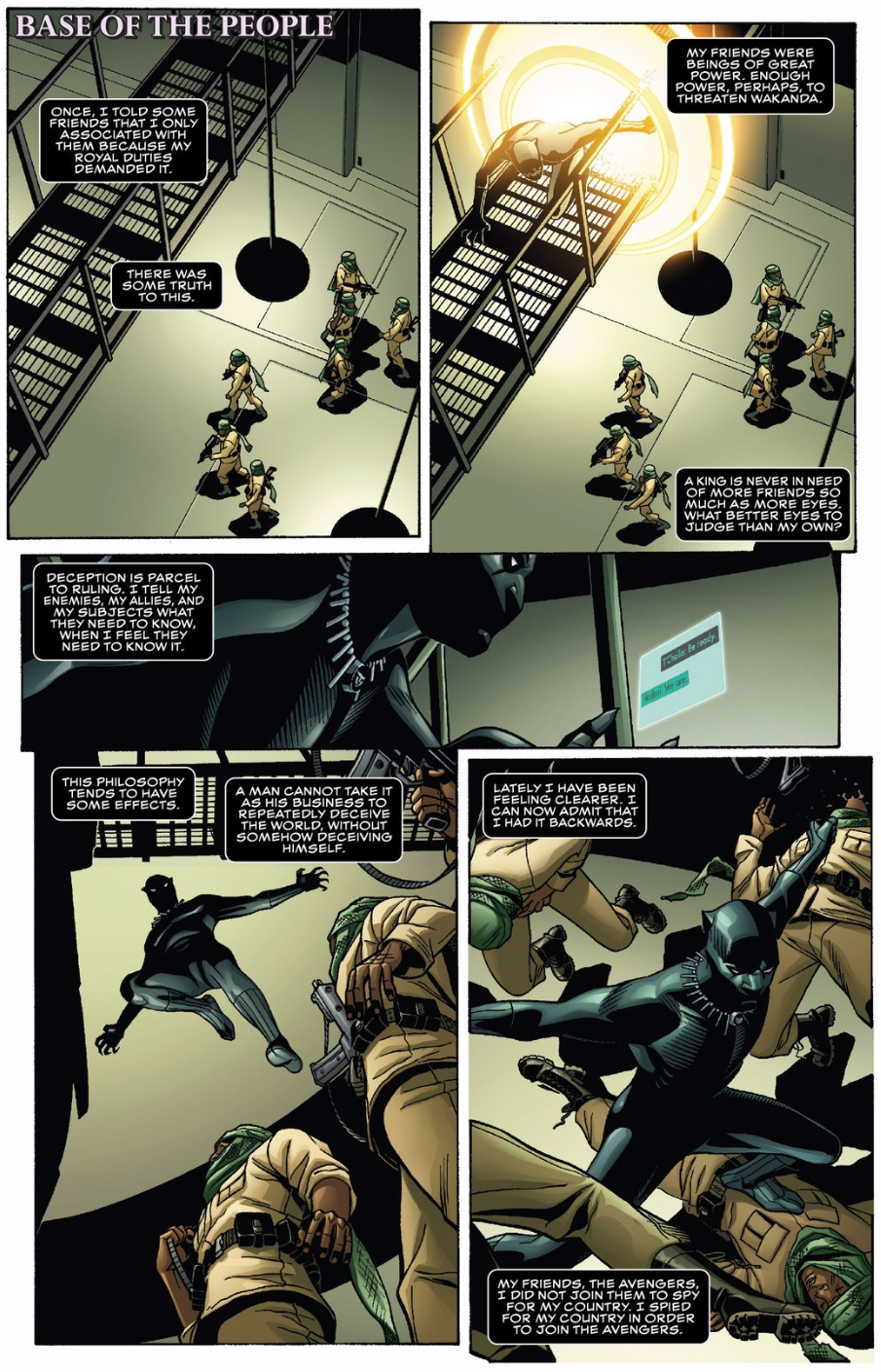
Coates: This is a scientist. The Avengers are going all over the galaxy. They’re doing all sorts of crazy shit. To not be a part of that is to deny a huge part of himself. Do you understand what I’m saying?
You have this man who’s a genius. He can’t just stay home in the lab and on the throne. And that’s him being a superhero before being a king, as you said.
Coates: Right. There you go.
He has a hunger for adventure which is something that McGregor used to pepper in there sometimes. T’Challa and his crew used to fly around and he’d get on the wing of the plane. This is not a guy who’s been just a brooding tactician his entire life.
Coates: No. My thing was like, T’Challa repeatedly has left the country for long stretches of time. He has repeatedly chosen romantic interests or expressed romantic interests with women who are not Wakandan. What I’m saying is there’s a desire to get out among us. Here’s a guy who was hailing from the most advanced civilisation in the world but goes to get educated in the West. What the fuck for?!
I remember that being written somewhere as T’Chaka’s decision. But you don’t go along with that unless you’re curious about the outside world.
Coates: For me, I was interested in all of those little undercurrents in T’Challa’s character. OK, if you say he’s, I don’t know what, fifth, sixth, whatever, third or fourth smartest person in the world, let’s take that shit. Let’s take that seriously. Let’s think about the science. Let’s think about whether the third, fourth, fifth most talented scientist in the world would necessarily make the best king. Would that person even want to be king? Those are the questions I really, really wanted to bring up with the run.
The point where we are at now is interesting because my interpretation is that you are healing the character. At the end of the Priest run, he was an emotionally tortured man. And to be the kind of dude that’s always five steps ahead of everyone, you’re not happy a lot of the time. That’s Batman-level shit, where you’re like, “OK, I’m paranoid about the world, even if I’m funnelling that paranoia into altruism.”
It’s a torturous mechanism by which to be a superhero, but I feel like you’re turning the tables a little bit on that. Where T’Challa wants to do good in the world and realises maybe being a king isn’t the best way to execute that.
Coates: Yeah. Those are the questions that I’m really trying to get to. There areso many parts to T’Challa. I think it’s a good to sit back and ask how well those parts cohere. There’s a lot of narrative juice to be gotten out of doing that, a lot of good stories to be done by asking, “How do these parts cohere as a human being?” You know?
I feel like you are doing the same thing with Shuri because you’re preventing her from becoming a footnote. She replaced T’Challa and became the first female Black Panther, but was not a great ruler. She was impulsive and brash.
Coates: And arrogant.
Right. T’Challa and Wakanda both got fucked up on her watch. And when T’Challa came back and it seemed like she was going to fade into the background and you’re not letting that happen.
In the current series, you have her in the Wakandan historical astral plane, learning what it means to connect with your people and what their concerns are and how to rule from a place of understanding and not just edicts.
Coates: A lot of these scenes are about bills coming due. This is Wakanda paying its bills. As you said, Shuri was not a great ruler. She was arrogant. She was brash. Under her watch, Wakanda is decimated. She is killed or near killed or sent to this other place, banished. Let’s just take a timeout here and let’s just think for a second: What happened here? One of the things I wanted to do with Wakanda is that Wakanda is more than what you see right now. It’s more than the present. Wakanda has history. It’s a 3-D place.
So when you say you represent a nation as its king or as its queen, you are not just responsible to the citizenry of the present, which T’Challa is answering for. T’Challa is answering for the citizens right now. He’s also responsible to that country’s history and to everything that came before it.
Shuri is now answering to that. She’s answering to the history, to her ancestors. The telling part for me is in I guess issue #3, where she says, “I am a queen.” The griot spirit that looks like [queen mother] Ramonda said to her, “And where are your subjects now? Where is your court? Where is your kingdom?” You’re talking that. You’re saying that. But what is the actual manifestation of you being that person?
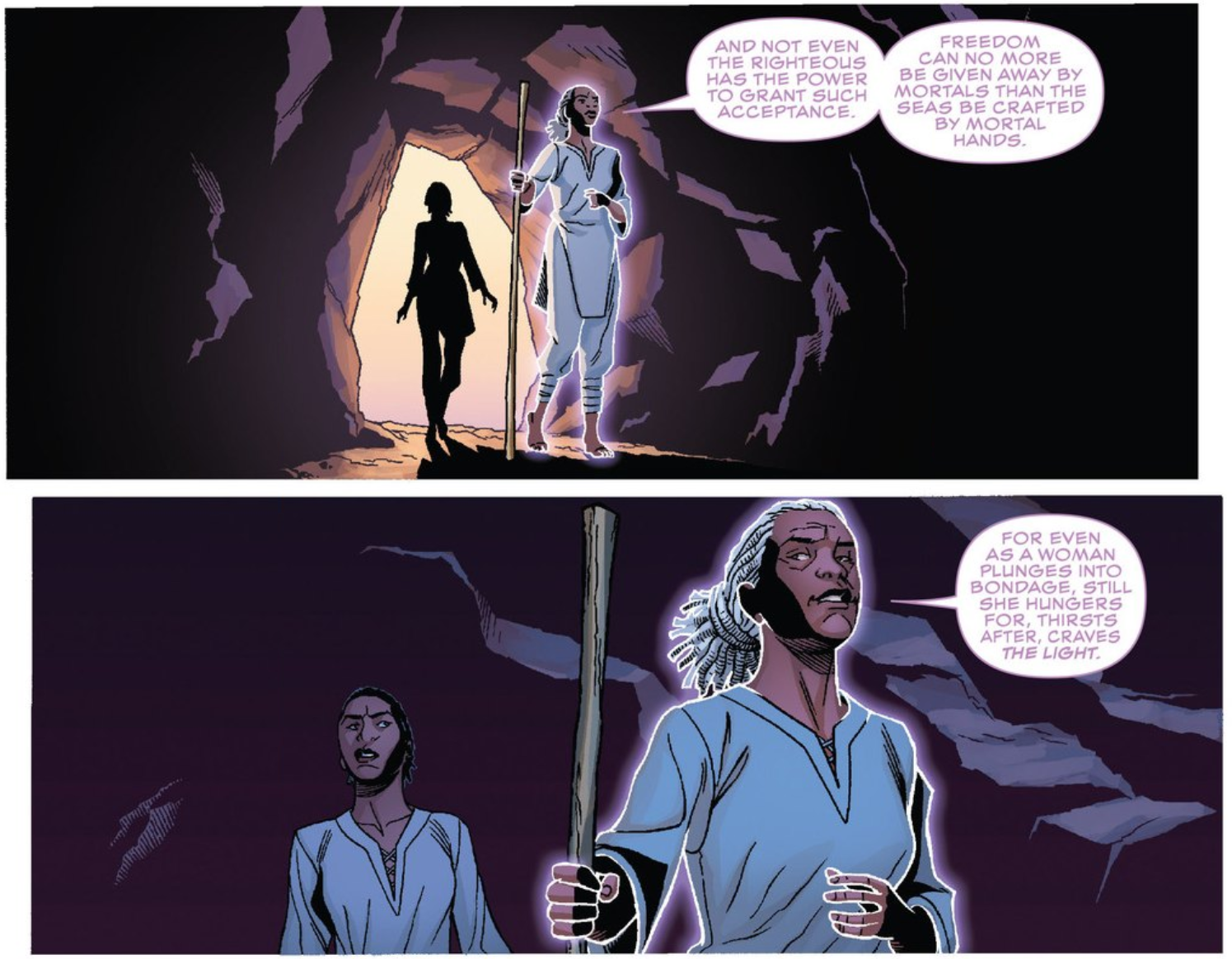
A lot of this is a humbling process for Shuri. The Shuri who comes out at the end — I think by now I’m not revealing anything by saying “she will come out” — will in no respect be the same Shuri at all. It’s going to be a different character.
To me, that needed to happen. I understand the impulse of her creation. It’s pretty old. Contrary to popular belief, Marvel did not just begin passing on mantles with, say, Miles Morales. These moments where you have somebody else taking up the identity, Marvel has been doing this literally for decades. Way before I started. You can take this back to the ’60s, whatever. The Human Torch was not the first Human Torch.
Exactly.
Coates: That’s really, really old for Marvel to do that. People are pissed because they’re doing it with black people and Latino people and women now. Now motherfuckers are pissed about it because of that. But it’s actually in Marvel’s history; they are just giving everybody access.
Having said that, for me as a writer, it’s always more interesting to build something new. It’s always more interesting for me to try and figure out who is this person. Who are they going to be? A lot of work when I was preparing to write, I was like, “OK, who is Shuri going to be at the end? What is this?” That will be clear I guess relatively soon.
io9: We’re talking about who these characters are and have been, T’Challa was a dude who would not ask for help. If you think about the big Priest storylines, like “Enemy of the State,” where there are team-ups and whatnot, he’s basically dragooning people to his side But you have him now actively calling in people for help.
Coates: With T’Challa now, you have this dude with diminished resources. T’Challa is not where he was during Priest’s run. By which I mean he does not have a fully serviceable Hatut Zeraze. He does not have Dora Milaje. He does not have the advisors. In fact, his most recent import of advisors just gave him some bad advice…
On that note, that might be the legit most shocking moment of the run for me as a fan and a reader. When T’Challa called in all those functionaries from the different “evil countries” of the Marvel Universe and they’re all sitting there offering their advice. I was like, “I can’t believe he’s doing this.” “He” meaning “you.” [laughs]
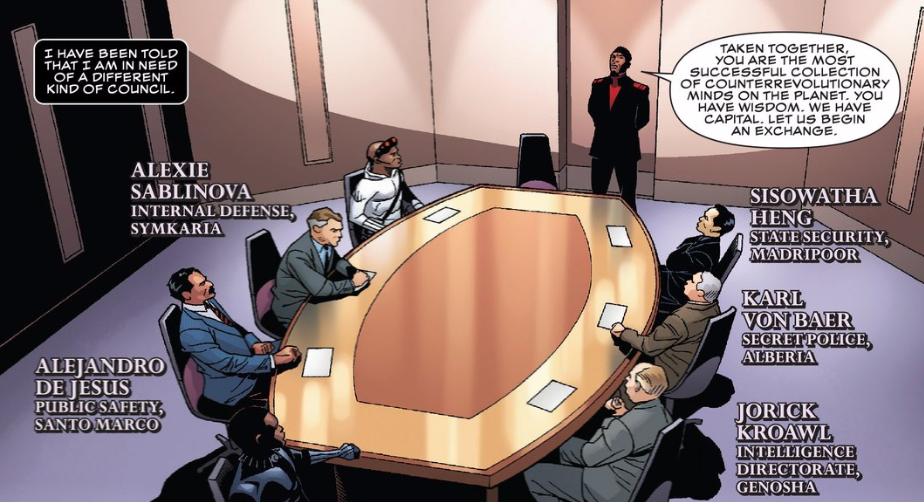
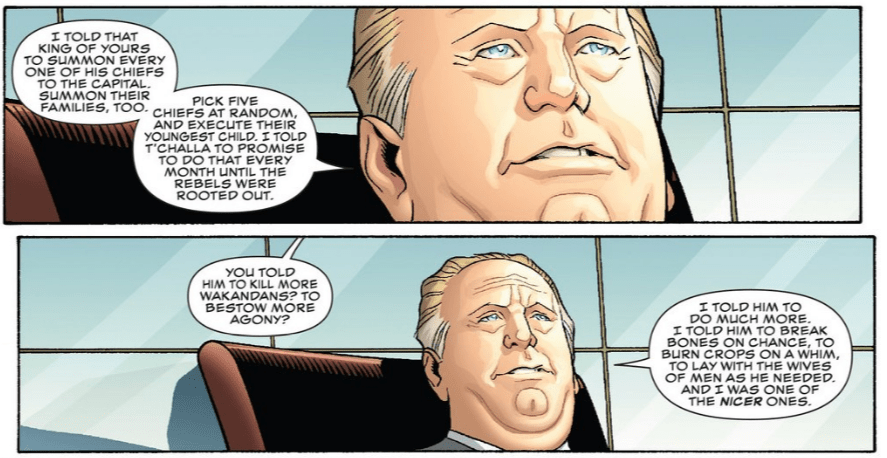
Coates: Again, but what do countries do? We live in the United States of America. A very nice country that considers itself to be totally, totally good. This is a country that tortured people, man. I mean recently. Not history. But within the last decade, this country was torturing people.
If you go over to Western Europe and you find the most advanced democracy and you go to a place like Belgium, which has in its history — within the past 100 to 200 years — vicious torture and colonialism.
There’s not a modern place in the world where you will go, pick the most modern state you want, and try to find a history, a recent history free of war crimes and war criminals and awful things happening. Not only is that not true of the world, it’s not even true of Wakanda before I started writing. If Wakanda is as badass as you say they are, did they get that way by being nice to people?
Did they get that way by smiling and having a stiff upper lip and being noble? In that advisory council, one of the guys is saying you guys are acting as if you’re better than us or something, like you don’t know anything about what we do. Sure you do. How did you get all this power? You got that power by just being nice? Really?
There’s a reason Vibranium doesn’t leave the country.
Coates: Right! Is it just that everybody keeps their word? Is this about the honour system? Is that how it works? No. Human questions, man. Human questions of human beings and society, over and over again. You got to ask.
That leads me to the last page of the issue, when the Crew shows up. The human question T’Challa has to ask himself is, “Am I up for putting down this insurrection with the resources on hand?”
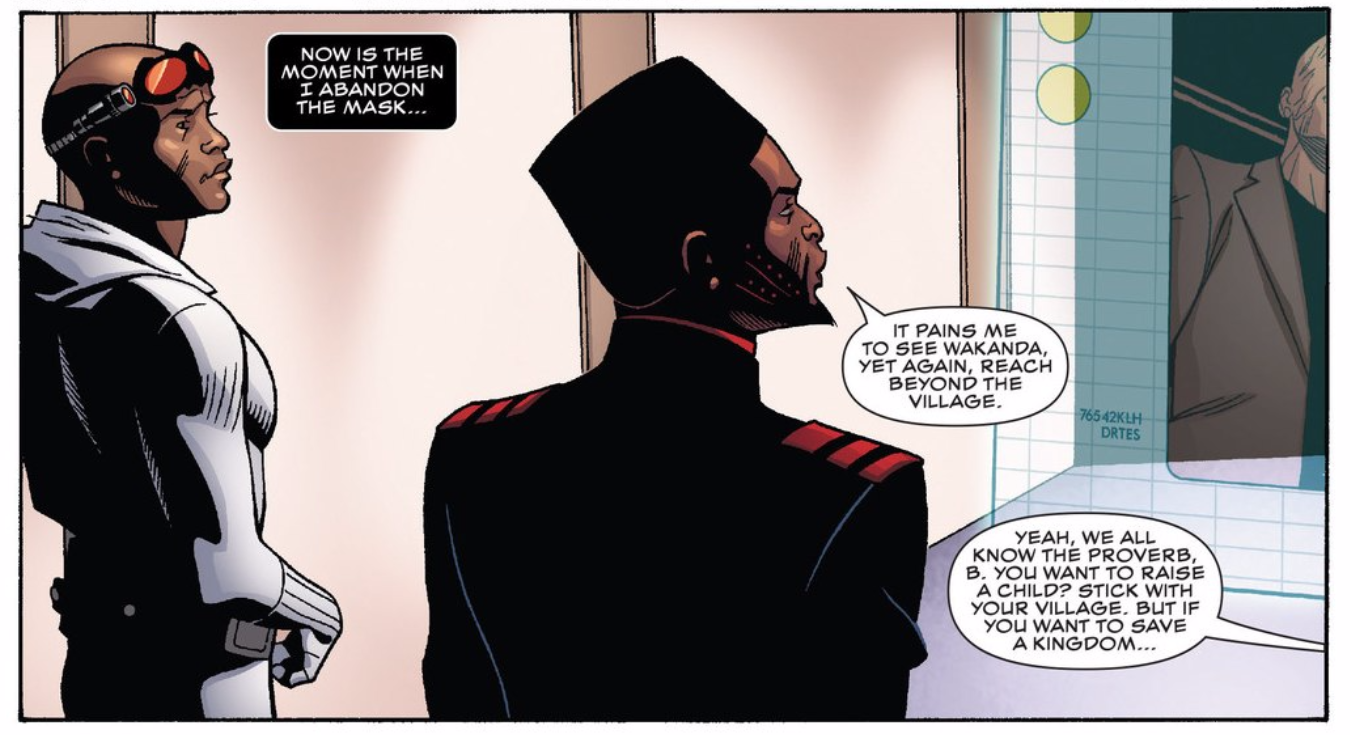
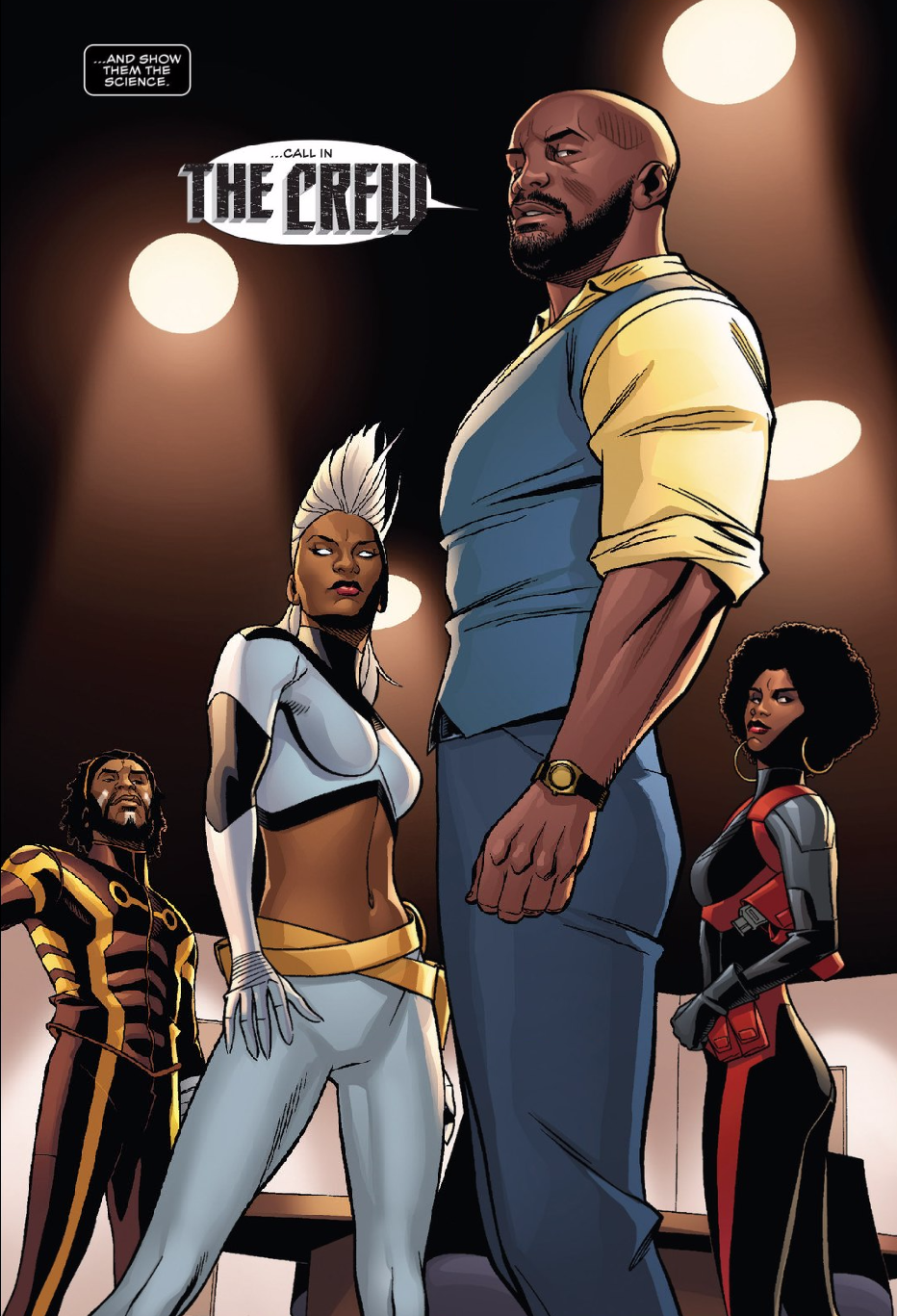
Coates: Right, exactly. From a pragmatic perspective, with the advisory council, some things happen that put that meeting into a different light by the end of the issue. T’Challa has his own plan with that meeting, too. This dude really, really wants to save his country. I prefer to take the interpretation that he is not so prideful that he would not call on any other help and risk his country falling. I just don’t think he would do that. We got to call folks in and deal with it later.
If you’ve got Storm on your contact list, or Luke Cage on your contact list … go ahead.
Coates: I think I can say [that] in some upcoming work the bond between these characters will be made a lot more clear.
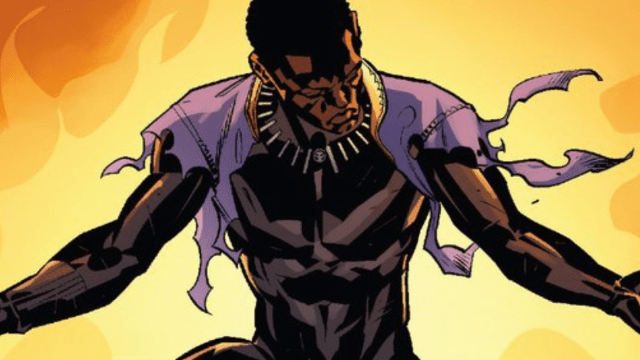
Comments